
Lebanon
How does one even try to begin to talk about what or why this war is happening? How does one reduce a long and controversial history into a presentation that the general public can understand? In the end, any such presentation is guaranteed to be easily and heavily criticized since the arguments have all been batted back and forth forever and a day.
On the EastSouthWestNorth blog, there are only two blog posts on Lebanon: Qana and Srifa. In both cases, I refrained from dealing with the political dimension. Instead, the theme was reduced simply to "My politics are pretty simple. Killing people is bad. Killing civilians is worse. Killing children is an obscenity." This was therefore a simple, emotional approach and deliberately purged of intellectual content. For that reason, there will be people who call it manipulative. But why shouldn't I say something 'regarding the pain of others'? Why should I be saying that those people deserved it?
Conversely, I am not capable of writing or even commenting on essays such as this one by Alan Dershowitz:
Lebanon has now declared war on Israel and its citizens are bearing the consequences. Lebanon is no more a victim of Hezbollah than Austria was a victim of Nazism. In fact a higher percentage of Lebanese--more than 80%--say they support Hezbollah. The figures were nearly as high before the recent civilian deaths.
...
According to a news report in the New York Times on Sunday, August 6th, Hezbollah is Lebanon and Lebanon is Hezbollah. It is "as much a part of society as is its Shiite faith." As a car mechanic put it, "we are Hezbollah." A café owner was even more direct: "Just because I'm sitting here in this café doesn't mean I'm not a resistance fighter." Of course if he were killed fighting Israel, his death would be listed as a "civilian" casualty. Nor is he alone. He continued: "Everyone has a weapon in his house...There are doctors, teachers, and farmers. Hezbollah is people. People are Hezbollah." Except, of course, when they are killed or injured fighting against Israel--then they become just 'people,' just "civilians." As a doctor asked rhetorically, as he pointed to dead bodies resulting from a battle between Israeli and Hezbollah forces, "Do you see anybody from Hezbollah?"
It is virtually impossible to distinguish the Hezbollah dead from the truly civilian dead, just as it is virtually impossible to distinguish the Hezbollah living from the civilian living, especially in the south. The "civilian" death figures reported by Lebanese authorities include large numbers of Hezbollah fighters, collaborators, facilitators and active supporters. They also include civilians who were warned to leave, but chose to remain, sometimes with their children, to serve as human shields. The deaths of these "civilians" are the responsibility of Hezbollah and the Lebanese government, which has done very little to protect its civilians.
Lebanon has chosen sides--not all Lebanese, but the democratically chosen Lebanese government. When a nation chooses sides in a war, especially when it chooses the side of terrorism, its civilians pay a price for that choice. This has been true of every war.
We must stop viewing Lebanon as a victim and begin to see it as a collaborator with terrorism. Nor is there any excuse for this choice. Lebanon was not "driven" to support Hezbollah by Israel or the U.S., as some Lebanese leaders falsely claim. Lebanon included Hezbollah in its government, knowing that it is a terrorist organization. It abdicated the responsibility for providing social, economic and police services in the south to Hezbollah.
The fact is that Alan Dershowitz has more chutzpah than I ever will. And this does not mean that I feel that I am a lesser person at all.
For a view from Hong Kong, here is a partial translation of a blog post at Between Psychosis and Hysteria on a candlelight vigil held at Star Ferry (Tsimshatsui).
[in translation]
I spent all afternoon watching the tv news. I felt that the Israel-Lebanon issue should not die down after the two demonstration marches organized by the InMediaHK civilian reporters. This "should not" has at least several meanings.
The first meaning is that we often criticize the mainstream media for having an attention not more than three days and so we should be embarrassed at going totally quiet after giving it a high degree of attention ourselves.
The second meaning is that I cannot believe that I would ever succumb to this imaginary defeat. That is to say, we in Hong Kong knew from the first minute that even though we shouted loudly and wrote many words about the war in the Middle East, we cannot stop the continued bombings. We make our big show here, but the number of casualties continues to rise over there. To continue here in Hong Kong this way does not constitute defeat because we expected it anyway, and therefore this cannot be the excuse for us to stop.
The third meaning is that without presuming any fantasy, the civilian reporters should explore their own limitations and then find the 'condition(s) of possiblity' within the 'conditions of impossibility.' We will never be able to dictate the warfare, but that does not mean that we should hang our heads down in despair.
...
There were actually not many lit candles at the candlelight vigil. We could not form the words 'cease fire' in Chinese or English because it was too windy at the pier next to Star Ferry and our lighters were not very good. Amnesty International invited the independent singer Arnold Fang to sing a few songs and then the participants took turns to speak out. The meeting was very low-keyed to the point of being solemn. The main theme of the meeting was 'cease fire' and the solemn atmosphere should be in memory of the dead. But we were practically overwhelmed by the sound coming from the loudspeakers for the large television screen at Ocean Terminal.
My friend was losing patience because he felt that this was the time to raise our fists and shout slogans. Looking at the participants speaking, I wonder if this is the special characteristic of Hong Kong people who have been living in an era of isolated peace. The speakers spoke exactly as expected. Even "Long Hair" Leung Kwok-hung said unenthusiatically that he had participated in several anti-war events but the mainstream media had no interest at all.
I actually wanted to say that I had a feeling of losing the ability to speak at the time. Suddenly, I did not know what I want to say, why I want to say and what I hope the outcome will be. The civilian reporters who take part in opposing the Israeli bombing of Lebanon find it difficult to a steady position. Their understanding of the facts will never be deep enough and they even have to wonder if their emotional involvement is overblown ...
For a view from mainland China, here is the partial translation from an essay by Liu Xiaobo (刘晓波). I emphasize that this is one view out of many, and there is no way to gauge whether this is the majority view.
(Boxun) Why do the Chinese Communists let Hezbollah off?
[in translation]
...
On July 25, in an air raid by Israel against Hezbollah, the Chinese military observer Du Zhaoyu with the UN Peacekeeping Force was killed; on August 6, in a missle attack by Hezbollah against Israel, three Chinese peacekeepers with the United Nations force were injured by explosions.
Even before the Chinese military personnel were attacked, the relevant reports and commentaries in the Chinese media were obviously supporting Hezbollah and condemning Israel. After the two attacks, the official Chinese response and the news reports showed even more obviously that the Chinese Communists were angry against Israel but forgiving towards Hezbollah.
The netizen named "NeoOnline" published a post titled "Comparison of news headlines after the bombings" at KDNet. The netizen had collected the news headlines in the Chinese media after the two separate incidents so that people can make comparisons. Within less than 24 hours, this forum post was viewed 16,844 times with 257 comments.
...
The two different responses by the Chinese officials and news media towards Israel and Hezbollah differ hugely in degree and quality. This cannot be explained by commonsense alone. This can only be explained by the consistent position of the Chinese Communists on the Middle East issue, as well as the broader background of the rivalry between China and the United States.
As everybody knows, when it comes to any Middle East problem (no matter whether it is the Israel-Palestine conflict, the Israel-Lebanon conflict, the war in Iraq or the nuclear crisis in Iran), the United States clearly supports Israel and they also started the war to bring down Saddam Hussein and oppose Iran. The Chinese Communists always stood on the side of tyrants, dictators, fundamentalists and terrorist organizations.
Specifically, the armed clash between Israel and Hezbollah this time was completely due to Hezbollah crossing the border into Israel to kidnap two Israeli soldiers. If the new Israeli government did not respond strongly, they would be accepting Hezbollah's actions and therefore betraying the trust of the Israeli people in this government -- is there any security guarantee left for Israel? As to saying how Israeli bombing killed many civilians, this is the typical ruse of all terrorist organizations, no matter whether it is Hamas or Hezbollah. They always establish their army bases near civilian sites; and if a certain area has UN observation posts, they will establish their bases near them.
Now this is exactly the sort of thing that I don't want to write. I am not going to write a rebuttal, although it would be easy (but not necessarily right either). For a completely different view on Lebanon, please read Juan Cole's Bush, Islamic Fascism and the Christians of Jounieh. I have not read anything like that from the Chinese, and this illustrates the point that this is a complex case and it is easier to take a reductionistic approach. Cole's essay lists a long string of facts and issues about history and demographics that are not encompassed by the simple umbrella theories of Dershowitz and Liu.
Let me take one simple point from Cole's essay and amplify it. Again, I have zero interest in the histories and politics. The subject here is very simply Ramlet el-Baida beach in the city of Beirut. Here are some photographs in the aftermath of the Israeli attack on the Jiyye oil refinery plant. Since this is a public beach that everybody can visit and see for themselves, there should not any accusations about 'staging' for the photographs. Yeah, I know, this is emotionally manipuative and inflammatory but what isn't? Look at the photographs and you can rationalize for yourself.

(AFP/File/Patrick Baz)

(AFP/File/Patrick Baz)

(AP Photo/Ben Curtis)
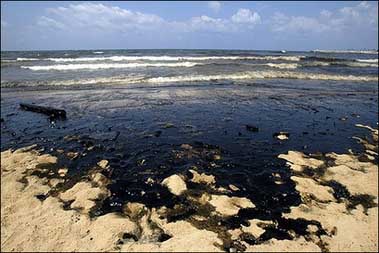
(AFP/File/Patrick Baz)
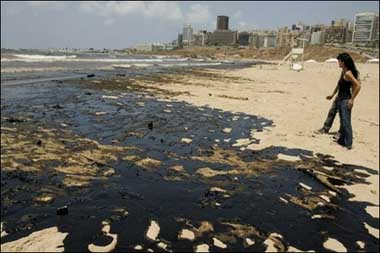
(AFP/Ramzi Haidar)
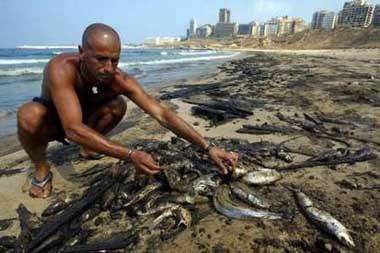
(REUTERS/Mohamed Azakir)
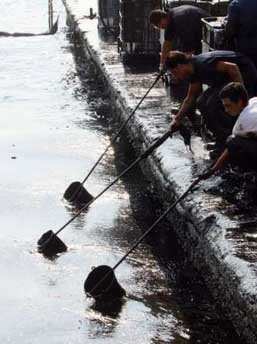
(REUTERS/Jamal Saidi)
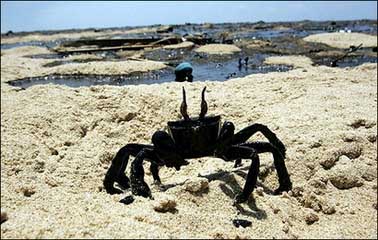
(AFP/Ramzi Haidar)
Related Link: Arab, Jew and Chinese Jonathan Ansfield, Spot-On